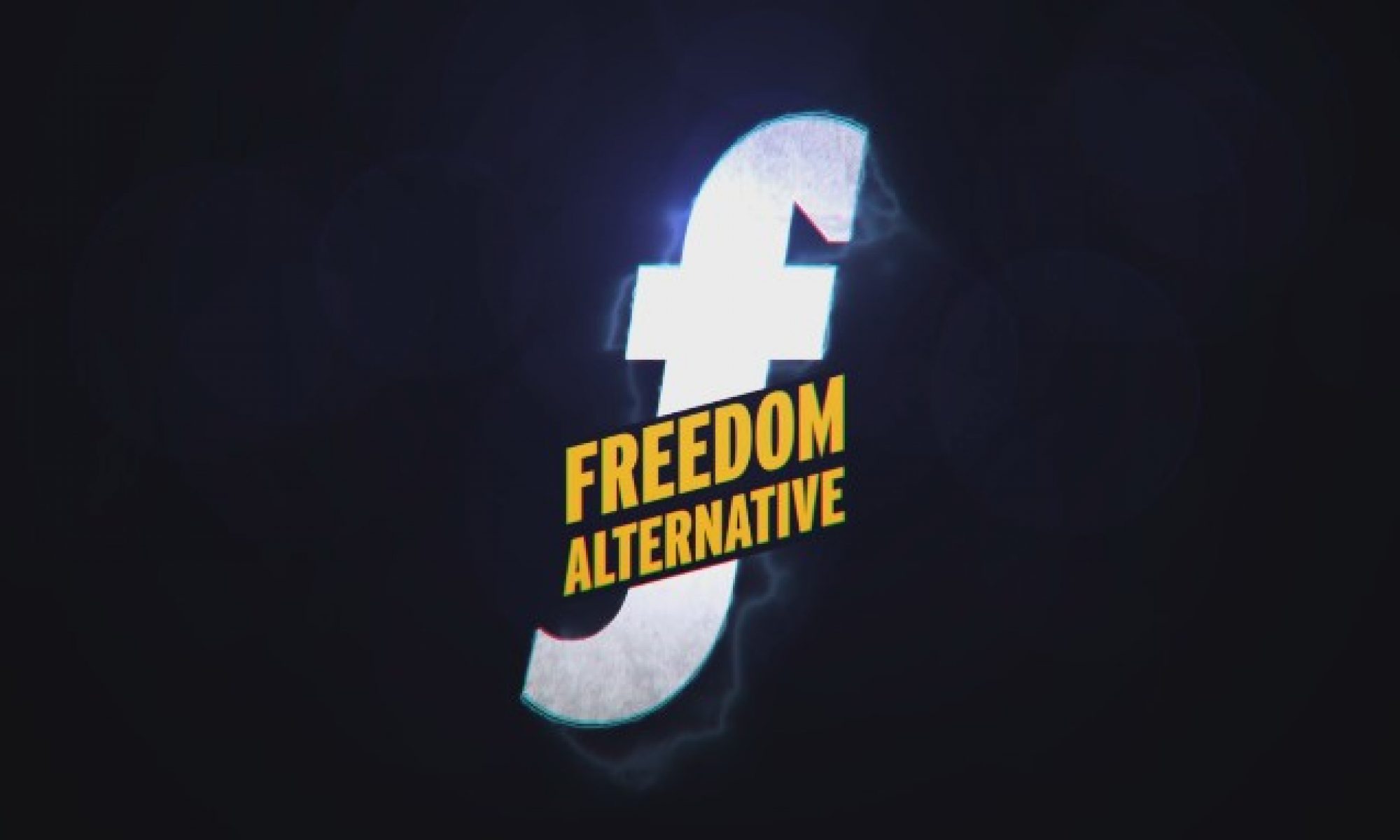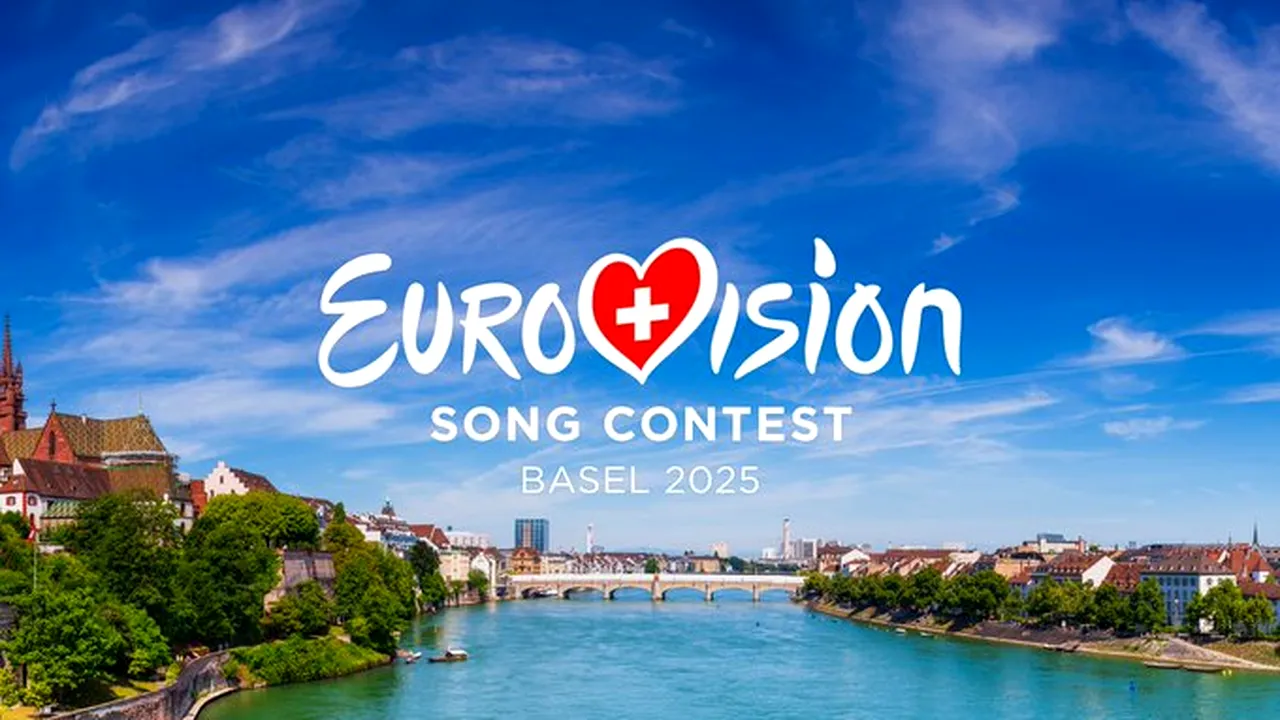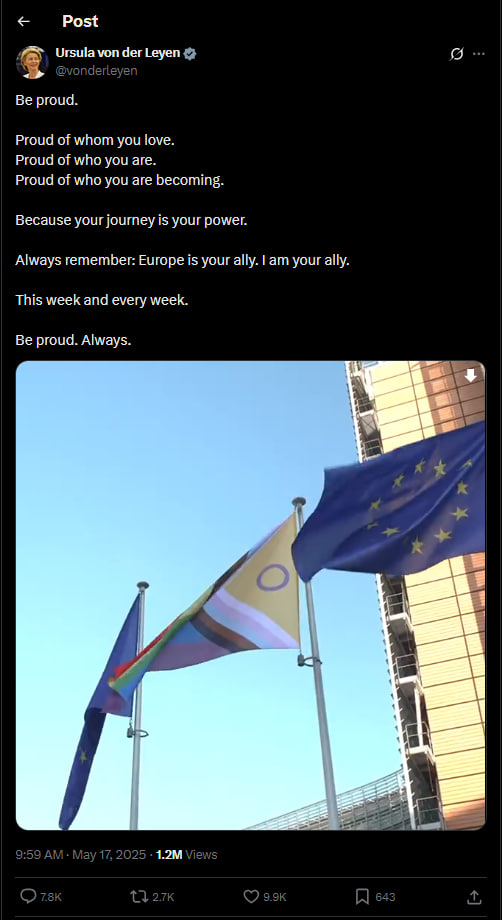I just finished watching the Grand Final of Eurovision 2025, held in Basel, Switzerland. I can’t write about politics today because the Romanian law says you can’t campaign in the day of the vote. But since Romania did not attend this year’s Eurovision (Mashallah we never do ever again 🙏🏻), I can tell you about how bad Eurovision was, obviously, with no connection to the election going on right now.
So, the “competition” took place in Switzerland because this guy won last year. If you are a normal person, you probably have no idea what that flag is. And that’s a good thing. The trouble is that the European Commission really wants you to know.
Why does this matter? Well, because if you live in a country of Europe, it is very likely that your taxpayer money funded this crap.
For decades, this was acceptable because it wasn’t too expensive and it scratched several itches. It kept a part of the culture busy, it allowed for friendly multiculturalism, it provided a good yearly proxy to grok the geopolitical mood of the establishment in each country and, occasionally, gave prominence to either a good song or some comedic or epic moment.
Since 2004, however, with the advent of Youtube, things have started to change while ESC, like any pan-European state bureaucracy, was slow to adapt, to put it mildly.
The model is passée
ESC is organized by something called the European Broadcasting Union (EBU) which unites all of the State broadcasters from Europe, including transcontinental countries like Türkiye, Azerbaijan, russia or Armenia (but not Qazaqstan!) plus three non-European countries – Morocco, Israel and Australia.
All of this may have been a good idea in 1950 when broadcasting was a highly expensive affair, but in 2025 technological change and (geo)politics are slowly, but surely, rendering the model obsolete. And not just when it comes to ESC, but generally, the very idea of EBU is very much passée.
You see, because it’s organized by what is effectively a State organization, the “competition” has to follow a centrally-decided model that is also at the same time compliant with all of the national rules and regulations of TV broadcasting in all of the 57 member countries (or 53, or 54, depending which week we’re talking about). Again, this was possible in 1950, but in 2025 it’s increasingly untenable.

And since 2014, when the “bearded woman” “won” the “competition” – this became self-evident for more and more people. One by one, countries started withdrawing from this because, again, if it’s State funded then it also means it’s accountable to normal politics and, ultimately, to the taxpayers.
Here’s a nice little table for you:
| Country | Last participation | Reasons |
|---|---|---|
| Andorra | 2009 | Financial |
| Belarus | 2019 | Political |
| Bosnia | 2016 | Political and financial |
| Bulgaria | 2022 | Political and financial |
| Hungary | 2019 | Political |
| Monaco | 2006 | Political and financial |
| Montenegro | 2025 | Did not participate in 2022, 2023 and 2024. |
| Morocco | 1980 | Political |
| North Macedonia | 2022 | Financial |
| Romania | 2023 | Political and financial (missed several in the 2010s as well) |
| russia | 2021 | Political |
| Slovakia | 2021 | Political and financial |
| Türkiye | 2012 | Political |
As you can see, the list has gotten pretty long in the last 5 years. And it’s very likely next year will be even longer than that.
And it’s not just the agenda driven nonsense (more on that later), but the model itself is now outside reality. Almost every year the most popular song does not win (2025 is the exception). Every single year (no exception at all), the final hierarchy is heavily influenced by nameless and faceless weirdos. And while that fact was well hidden in 2005, it’s impossible to keep it hidden in 2025.
It also doesn’t help that due to technological change, the most popular artists don’t need ESC, thus further deepening the crisis of the model itself. In 2025 it is simply weird to think that a bunch of has-beens from the 1980s (or even older!) can have a reasonable opinion on what is popular and good in terms of music for a diverse continent like Europe in 2025. Ain’t no-one buying that!
Nobody is watching it
All of the above would’ve been excusable if the line went up. Any line, really. The show is not profitable, it has declining audience numbers (even as EBU fudges with the statistics), and it’s increasingly too expensive even for richer countries.
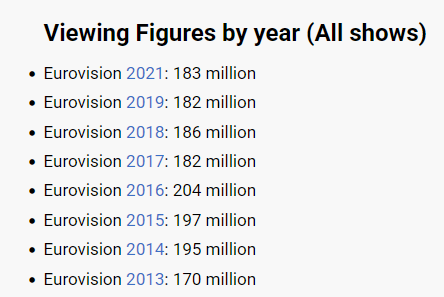
In 2022, 2023 and 2024 it barely cracked 160 million viewers and in 2025 I’d be honestly surprised if it surpasses 150 million viewers. And this is with EBU’s way of counting which effectively adds up all of the viewers “across all ESC content leading up to and over the event weeks”. So, in reality, there’s barely 30 million people that watch this.
Romania not only didn’t attend, but didn’t even broadcast the thing in 2025. So I watched it on Youtube. At the peak there were 1.4 million people watching live. That’s slightly more than the total number of people watching a Turkish TV show last night just in Romania alone. The difference being that zero taxpayer money are being spent on that.
Meanwhile, organizing this thing costs around €50 million – and that’s just the contribution of the organizing broadcaster (the host country) and the city hall of the city (Basel in the case of 2025). Add to that the lodging costs of all delegations (paid by each individual member organization – which is also taxpayers’ money), plus the cost of organizing a “national selection” (also taxpayer dough) and you’re climbing really fast to over €100 million in taxpayers’ money for this thing.
Sure, €100 million across 37 countries may not seem much, but €100 million means almost the cost of a brand new stadium, or the operating costs for several big hospitals for a year, or even the construction of a brand new smaller hospital (no, I’m not joking – there’s a public bidding right now for a €70 million contract to build a new hospital from scratch). €100 million is a lot of money given the negative value that ESC now offers.
There is no core audience anymore
Until 2019 (at the latest) the core audiences were nostalgic boomers and people tuning in for the cringe. But, in the last 6 years, ESC managed to alienate those as well.
The “no politics” rule means the Israeli competitor doesn’t get to talk about how she survived October 7 by literally hiding under corpses, but that suddenly doesn’t apply to the endless stream of LGBT-ist propaganda. Why? Because in Europe, LGBT-ist propaganda is legally not a political point of view (even though it absolutely is), but “human rights law” (as if “human rights” isn’t in itself a mere opinion like all others).
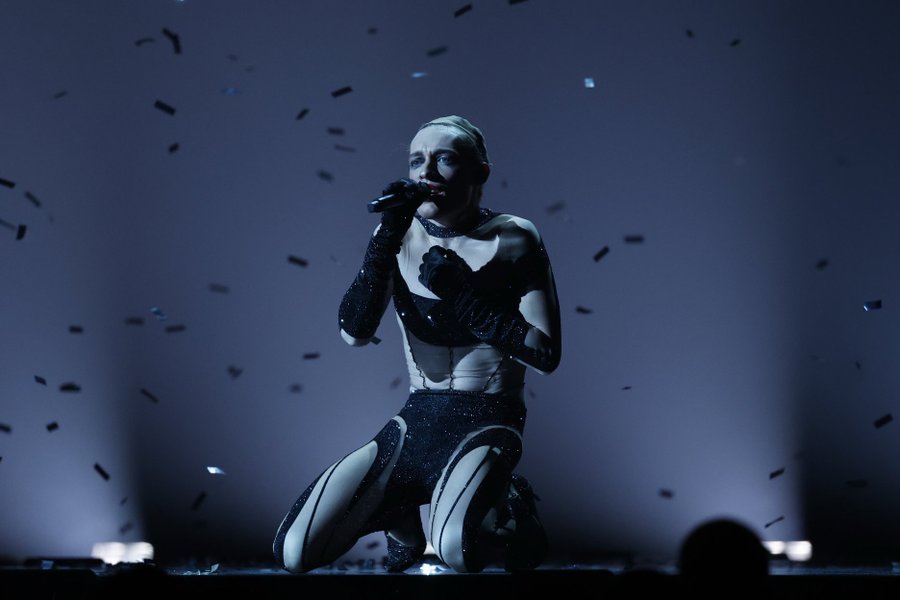
By tradition, the last year’s winner is invited to perform. This is how he showed up. This doesn’t break the “no nudity and sexual innuendo” guidelines, according to EBU. Neither is his celebration of Hamas break the “no politics” rule, apparently.
In an attempt to please everybody, EBU is in fact pleasing nobody and thus sealing the fate of the whole project. And it’s unlikely that this will be turned around under the current constraints.
What can be done
After watching yet another dogshit show, I sincerely believe the Romanian and Hungarian strategy is the best for all countries: Cite financial reasons and get the fuck out of this shitshow.
It’s not salvageable. The institutional resistance to reform is too great and no coherent argument is going to persuade them. We tried. The very idea of getting private partners on board and improve the management and the finances was received with shock and horror by the BBC, the Swiss broadcaster, France Médias Monde or TVE – and these guys’ opinion matters the most. I say: “Fine. Have at it and leave us alone.”
If the westoids don’t want to fix this money sink, then let them pay for it without the rest of us.
The most likely countries where you can have some success in the following years, politically speaking, to get them out are: The United Kingdom (if Reform wins), Poland, France (if Bardella wins), Italy (traditionally Italy stayed out more than it stayed in – so it’s worth a shot again), the ex-Yugoslav countries (especially Croatia after it was done to them in 2024), Cyprus (for financial reasons) and Albania (for their constant mistreatment over the last decade because they’re never gay).
Meanwhile, those in countries like Slovakia, Romania, Hungary or Bulgaria should continue to hold the line.
This beast needs to be starved. And again, since funding it is a political decision, don’t be shy to use hardline politics to push for its defunding.
Heck, I’m thinking we should get some MEPs on this as well.
If we’re paying for this, we want to have a say in how it’s run. It really is that simple.
Ideally, we take over it and turn it into a festival for the Europe of nations. But, in order for that to happen, the current crop of management has to go. And the fastest way to do that is to defund it, country by country.
You may not think this is important enough to be worth the energy, but please do keep in mind that ILGA-Europe (the main pusher of LGBT-ism in Europe) has a budget of just €5m/year these days. Down from tripple-digits a decade ago. They themselves are complaining.
LGBT-ism exists as long as there’s funding for it. Eurovision is just one giant LGBT-ist operation at this point. A €100m/year operation, to be more precise. Taking it down (or taking it over, if possible) would be a huge win for subsidiary purposes. The cultural relevance of Eurovision is gone, but the resources it still redistributes to LGBT causes are still immense and continue to have negative consequences on our cultures and our societies. And if you don’t control those resources, then by definition the enemy does.
Call your MP. See who you know inside the public broadcaster. You’d be surprised how easy it can be in most countries to gather the critical institutional support for a reduction or withdrawal from this shitshow.
Let the lefties fund it with their own dough if they want to continue this. Get your tax shekalim out of this mess!
And if you’re in Poland or Romania, please do think about this today as you head out for a vote 🙂
